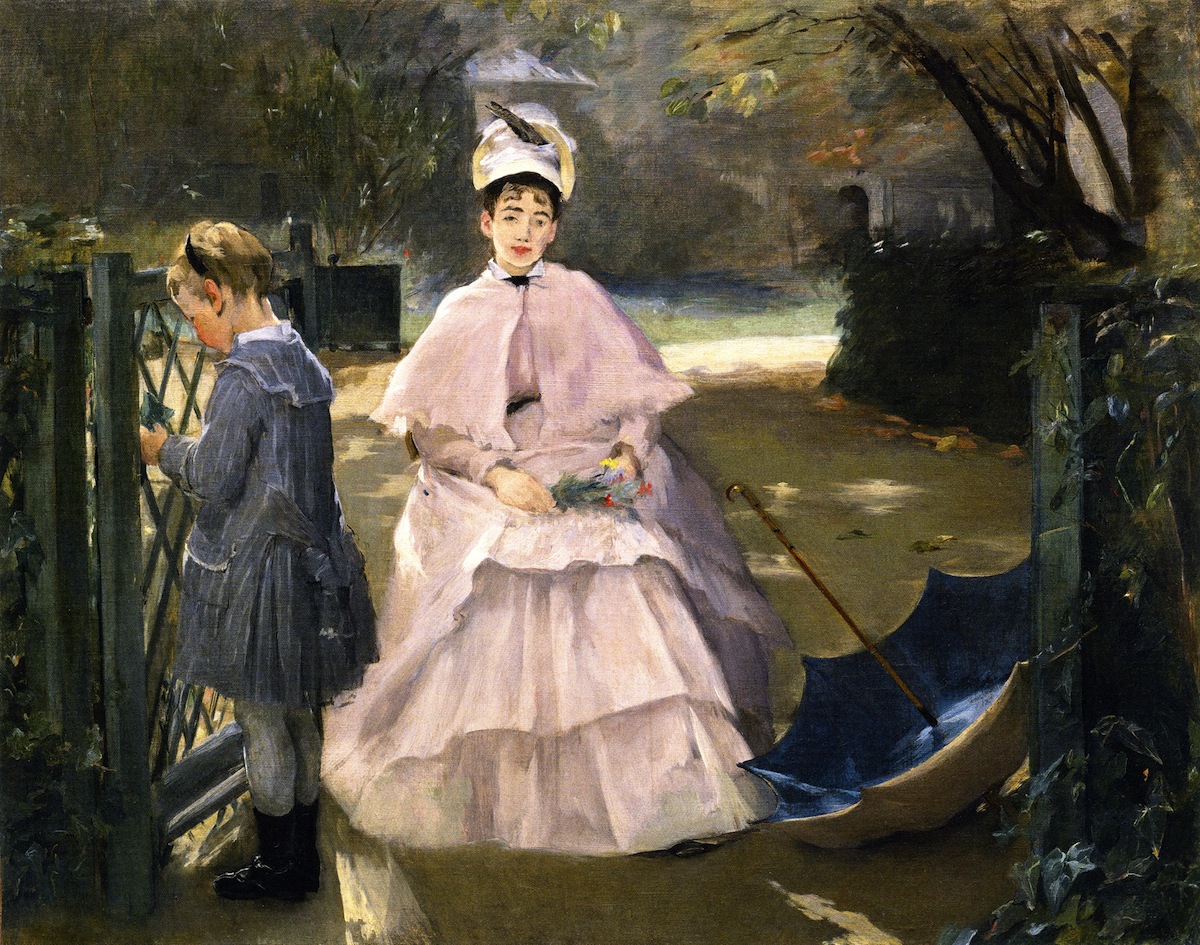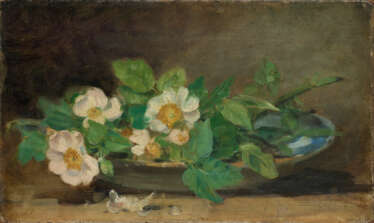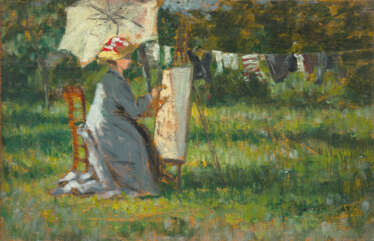ева гонсалес (1849 - 1883)

Eva Gonzalès was a distinguished French painter known for her significant contributions to the Impressionist movement. Despite her association with the Impressionists, Gonzalès' style was unique and evolved over time, reflecting both her mentor Édouard Manet's influence and her own personal artistic vision. She explored her identity as an artist through self-portraits and often used her sister Jeanne as a model in her depictions of polite daily life. Gonzalès' works were recognized and appreciated during her lifetime, exhibited in prestigious venues, and continue to be celebrated in collections worldwide.
Eva Gonzalès' art is notable for its intimate domestic scenes, often featuring women and children in everyday settings, imbued with a sense of realism and emotional depth. Her experimentation with pastels in the mid-1870s allowed her to achieve a distinct softness and luminosity in her work, particularly in her portrayals of women and flowers. Some of her most celebrated pieces, like "A Loge at the Théâtre des Italiens" and "Nanny and Child," demonstrate her skill in capturing the nuances of light and character, typical of Impressionist objectives.
Her works are held in esteemed institutions such as the Musée d'Orsay and The Metropolitan Museum of Art, where her pieces continue to captivate audiences with their delicate sensibility and nuanced expression. Through her paintings, Eva Gonzalès offers a window into the nuanced interplay of personal and artistic life in 19th-century France, leaving a lasting legacy in the realm of Impressionist art.
For collectors and art enthusiasts keen on exploring the intricate beauty and historical significance of Eva Gonzalès' work, delving into her oeuvre offers a rich journey into the heart of French Impressionism. To stay updated on sales and auctions featuring Gonzalès' works, signing up for updates can provide exclusive insights into opportunities to engage with her artistry.


Eva Gonzalès was a distinguished French painter known for her significant contributions to the Impressionist movement. Despite her association with the Impressionists, Gonzalès' style was unique and evolved over time, reflecting both her mentor Édouard Manet's influence and her own personal artistic vision. She explored her identity as an artist through self-portraits and often used her sister Jeanne as a model in her depictions of polite daily life. Gonzalès' works were recognized and appreciated during her lifetime, exhibited in prestigious venues, and continue to be celebrated in collections worldwide.
Eva Gonzalès' art is notable for its intimate domestic scenes, often featuring women and children in everyday settings, imbued with a sense of realism and emotional depth. Her experimentation with pastels in the mid-1870s allowed her to achieve a distinct softness and luminosity in her work, particularly in her portrayals of women and flowers. Some of her most celebrated pieces, like "A Loge at the Théâtre des Italiens" and "Nanny and Child," demonstrate her skill in capturing the nuances of light and character, typical of Impressionist objectives.
Her works are held in esteemed institutions such as the Musée d'Orsay and The Metropolitan Museum of Art, where her pieces continue to captivate audiences with their delicate sensibility and nuanced expression. Through her paintings, Eva Gonzalès offers a window into the nuanced interplay of personal and artistic life in 19th-century France, leaving a lasting legacy in the realm of Impressionist art.
For collectors and art enthusiasts keen on exploring the intricate beauty and historical significance of Eva Gonzalès' work, delving into her oeuvre offers a rich journey into the heart of French Impressionism. To stay updated on sales and auctions featuring Gonzalès' works, signing up for updates can provide exclusive insights into opportunities to engage with her artistry.


Eva Gonzalès was a distinguished French painter known for her significant contributions to the Impressionist movement. Despite her association with the Impressionists, Gonzalès' style was unique and evolved over time, reflecting both her mentor Édouard Manet's influence and her own personal artistic vision. She explored her identity as an artist through self-portraits and often used her sister Jeanne as a model in her depictions of polite daily life. Gonzalès' works were recognized and appreciated during her lifetime, exhibited in prestigious venues, and continue to be celebrated in collections worldwide.
Eva Gonzalès' art is notable for its intimate domestic scenes, often featuring women and children in everyday settings, imbued with a sense of realism and emotional depth. Her experimentation with pastels in the mid-1870s allowed her to achieve a distinct softness and luminosity in her work, particularly in her portrayals of women and flowers. Some of her most celebrated pieces, like "A Loge at the Théâtre des Italiens" and "Nanny and Child," demonstrate her skill in capturing the nuances of light and character, typical of Impressionist objectives.
Her works are held in esteemed institutions such as the Musée d'Orsay and The Metropolitan Museum of Art, where her pieces continue to captivate audiences with their delicate sensibility and nuanced expression. Through her paintings, Eva Gonzalès offers a window into the nuanced interplay of personal and artistic life in 19th-century France, leaving a lasting legacy in the realm of Impressionist art.
For collectors and art enthusiasts keen on exploring the intricate beauty and historical significance of Eva Gonzalès' work, delving into her oeuvre offers a rich journey into the heart of French Impressionism. To stay updated on sales and auctions featuring Gonzalès' works, signing up for updates can provide exclusive insights into opportunities to engage with her artistry.


Eva Gonzalès was a distinguished French painter known for her significant contributions to the Impressionist movement. Despite her association with the Impressionists, Gonzalès' style was unique and evolved over time, reflecting both her mentor Édouard Manet's influence and her own personal artistic vision. She explored her identity as an artist through self-portraits and often used her sister Jeanne as a model in her depictions of polite daily life. Gonzalès' works were recognized and appreciated during her lifetime, exhibited in prestigious venues, and continue to be celebrated in collections worldwide.
Eva Gonzalès' art is notable for its intimate domestic scenes, often featuring women and children in everyday settings, imbued with a sense of realism and emotional depth. Her experimentation with pastels in the mid-1870s allowed her to achieve a distinct softness and luminosity in her work, particularly in her portrayals of women and flowers. Some of her most celebrated pieces, like "A Loge at the Théâtre des Italiens" and "Nanny and Child," demonstrate her skill in capturing the nuances of light and character, typical of Impressionist objectives.
Her works are held in esteemed institutions such as the Musée d'Orsay and The Metropolitan Museum of Art, where her pieces continue to captivate audiences with their delicate sensibility and nuanced expression. Through her paintings, Eva Gonzalès offers a window into the nuanced interplay of personal and artistic life in 19th-century France, leaving a lasting legacy in the realm of Impressionist art.
For collectors and art enthusiasts keen on exploring the intricate beauty and historical significance of Eva Gonzalès' work, delving into her oeuvre offers a rich journey into the heart of French Impressionism. To stay updated on sales and auctions featuring Gonzalès' works, signing up for updates can provide exclusive insights into opportunities to engage with her artistry.


Eva Gonzalès was a distinguished French painter known for her significant contributions to the Impressionist movement. Despite her association with the Impressionists, Gonzalès' style was unique and evolved over time, reflecting both her mentor Édouard Manet's influence and her own personal artistic vision. She explored her identity as an artist through self-portraits and often used her sister Jeanne as a model in her depictions of polite daily life. Gonzalès' works were recognized and appreciated during her lifetime, exhibited in prestigious venues, and continue to be celebrated in collections worldwide.
Eva Gonzalès' art is notable for its intimate domestic scenes, often featuring women and children in everyday settings, imbued with a sense of realism and emotional depth. Her experimentation with pastels in the mid-1870s allowed her to achieve a distinct softness and luminosity in her work, particularly in her portrayals of women and flowers. Some of her most celebrated pieces, like "A Loge at the Théâtre des Italiens" and "Nanny and Child," demonstrate her skill in capturing the nuances of light and character, typical of Impressionist objectives.
Her works are held in esteemed institutions such as the Musée d'Orsay and The Metropolitan Museum of Art, where her pieces continue to captivate audiences with their delicate sensibility and nuanced expression. Through her paintings, Eva Gonzalès offers a window into the nuanced interplay of personal and artistic life in 19th-century France, leaving a lasting legacy in the realm of Impressionist art.
For collectors and art enthusiasts keen on exploring the intricate beauty and historical significance of Eva Gonzalès' work, delving into her oeuvre offers a rich journey into the heart of French Impressionism. To stay updated on sales and auctions featuring Gonzalès' works, signing up for updates can provide exclusive insights into opportunities to engage with her artistry.










